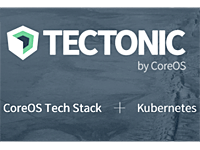CoreOS and OpenStack have a somewhat intertwined history, which is why it’s somewhat surprising it took until today for CoreOS’s Tectonic Kubernetes distribution to provide an installer that targets OpenStack cloud deployments.
The founders of CoreOS originally worked at Rackspace, alongside the founders of OpenStack, and CoreOS  executives have been a common sight at OpenStack events and even on the keynote stage. In fact, in April 2016, CoreOS CEO Alex Polvi gave a very well-received keynote demo of a project called Stackanetes, which enables Kubernetes to deploy an OpenStack cloud.
executives have been a common sight at OpenStack events and even on the keynote stage. In fact, in April 2016, CoreOS CEO Alex Polvi gave a very well-received keynote demo of a project called Stackanetes, which enables Kubernetes to deploy an OpenStack cloud.
Mackenzie Burnett, product manager for Tectonic at CoreOS, explained that the new Tectonic Installer support for OpenStack is the reverse of what Stackanetes is all about. Burnett first pointed out there wasn’t any one specific technical challenge that CoreOS faced in building its Tectonic installer for OpenStack; rather, she noted that in general, OpenStack environments tend to be highly customized.
“There is a common joke, that is there is no such thing as plain vanilla OpenStack,” Burnett told ServerWatch. “Every OpenStack deployment is customized, and building an installer that takes that into account has been the tricky part.”
The Demand for Kubernetes Inside of OpenStack
From a market perspective, Burnett said there is a lot of demand from companies that want to deploy Kubernetes inside of OpenStack.
Kubernetes inside of OpenStack is also not a new or unique idea. The Rackspace-led Magnum project is all about enabling container orchestrations systems, including Kubernetes, to run in OpenStack deployments.
Burnett noted the Tectonic installer doesn’t specifically target the OpenStack Magnum project. She said that initially the goal is to build the installer for the OpenStack Neutron networking project as well as potentially for the OpenStack Nova compute project.
In addition to the OpenStack target for the Tectonic installer, CoreOS is now also providing a target for Microsoft Azure as well. Going a step further, Burnett said the plan is to make the entire Tectonic installer open source.
“The installer is pure upstream Kubernetes,” Burnett said. “This is the only installer that will be able to install Kubernetes in a way that we can apply our self-driving philosophy to.”
CoreOS has been pushing its vision of self-driving Kubernetes since December 2016. In an interview with ServerWatch, CoreOS CTO Brandon Philips explained that his company had been investing in architecture work inside of Kubernetes to enable the management of Kubernetes components using the Kubernetes API. That is what CoreOS calls “self-hosted Kubernetes.”
Sean Michael Kerner is a senior editor at ServerWatch and InternetNews.com. Follow him on Twitter @TechJournalist.

